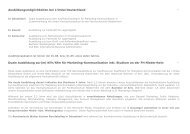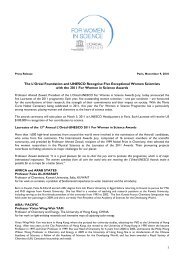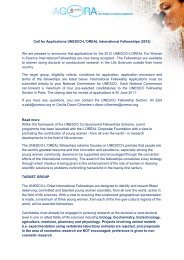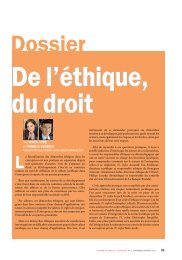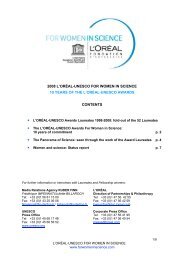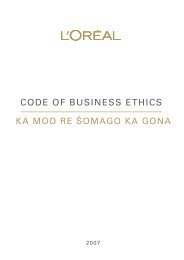2011 EDITION
2011 EDITION
2011 EDITION
Create successful ePaper yourself
Turn your PDF publications into a flip-book with our unique Google optimized e-Paper software.
For her work on the chemical<br />
composition of nebulae which is<br />
fundamental to our understanding<br />
of the origin of the universe<br />
The Future of the Universe<br />
In the first three minutes following the Big Bang, the only<br />
elements produced in abundance were hydrogen and helium.<br />
The other elements were created later via fusion processes<br />
inside stars. The respective quantity of helium and hydrogen in<br />
the early universe is extremely important because it can help<br />
shape our understanding of the first moments of the universe.<br />
By studying the Large Magellanic Cloud, the brightest HII<br />
region visible from Earth, and the Orion Nebula, Professor<br />
Torres-Peimbert and her colleagues were the first to establish<br />
differences in helium abundance among nebulae from different<br />
galaxies. According to their research, the amount of helium<br />
in the universe has increased throughout its evolution, which<br />
could shed new light on the future of the universe.<br />
At this early stage of the 21st century, Silvia Torres-Peimbert is<br />
at the leading edge of research on the very first generations of<br />
stars and galaxies, which remain one of the major mysteries of<br />
astronomical research.<br />
Sharing Stars<br />
with the Whole World<br />
Professor Torres-Peimbert received her bachelor’s degree at<br />
the National Autonomous University of Mexico (UNAM) and<br />
her PhD in Astronomy at the University of California - Berkeley.<br />
She has been a professor in the Faculty of Sciences at UNAM<br />
since 1972 and a professor in the Institute of Astronomy since<br />
1976.<br />
She has received several awards from the Mexican Physical<br />
Society, the National University of Mexico, and other national<br />
and international organizations including the guillaume Budé<br />
Medal from the Collège de France. She is a member of the<br />
American Astronomical Society, the Astronomical Society<br />
of the Pacific, TWAS, The Academy of Sciences for the<br />
Developing World and Vice President of the International<br />
Astronomical Union.<br />
She has been chief editor of a scientific journal and has<br />
delivered more than 250 talks for the general public. She also<br />
produces TV and radio shows designed to popularise science.<br />
SILVIA TORRES-<br />
PEIMBERT<br />
IN HER OWN<br />
WORDS<br />
PASSION BEATS TRADITION<br />
“When I was a student,” she pointed<br />
out, “women in Mexico were not<br />
expected to have a career”. Although<br />
her family was supportive throughout<br />
her studies, she still remembers the<br />
feeling of being at cross purposes with<br />
the principles of traditional education.<br />
That is why she also insists on the<br />
need to promote “deeper changes<br />
in the attitudes of men and women<br />
starting early in life.”<br />
TEACHINg NEW ATTITUDES<br />
TO OUR CHILDREN<br />
“The main challenges I had to overcome<br />
were my own expectations of<br />
the role of women in society. At several<br />
stages in my life, I had to stop and<br />
reflect on my real interests, in order to<br />
prioritize my activities,” she explains,<br />
adding that when she looks back on<br />
her choices, she is “very glad to have<br />
been so defensive of my career.”<br />
For future generations, she emphasizes<br />
the need to instil new attitudes as early<br />
as possible: “Significant differences in<br />
attitudes are taught to boys and girls<br />
at an early age, and are very difficult to<br />
discard later in life.”<br />
ACCOMPLISHINg MORE<br />
AND BETTER WITH LESS<br />
Scientists in the developing countries<br />
must deal with additional hardships,<br />
such as “carrying out competitive<br />
research with fewer resources and<br />
outdated equipment.” With fewer<br />
scientists per capita and only a small<br />
share of GDP invested in science, the<br />
developing countries have a real need<br />
for scientists.



